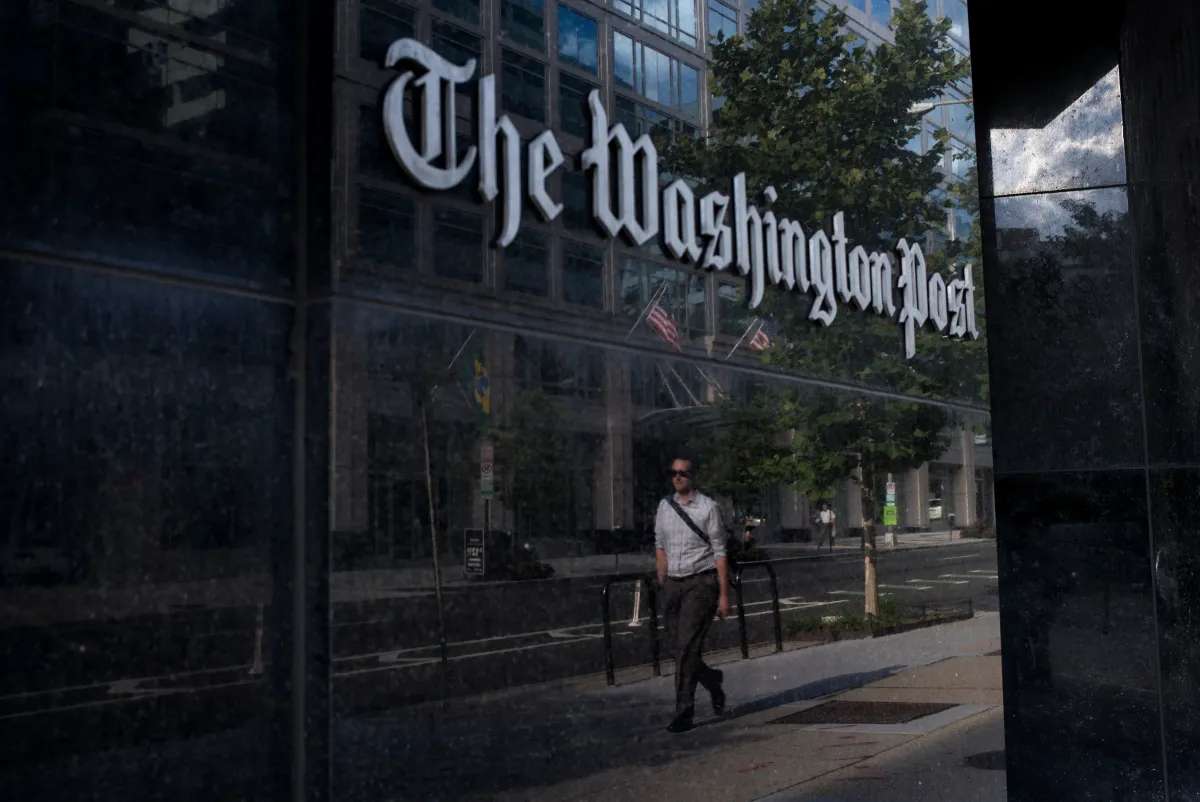Democracy Dies in a Rebrand
Democracy doesn’t die in darkness—it dies in a rebrand, as watchdogs are neutered into lapdogs

The Washington Post, formerly one of America's most respected newspapers and home to the slogan "Democracy Dies in Darkness" unveiled its new mission statement this week: "Riveting Storytelling for All of America."
The announcement comes amid an exodus of top talent, plummeting subscriptions, and a staff revolt against owner Jeff Bezos over euthanized editorials and the death of editorial independence. Just months before Trump's anticipated return to the White House, the paper that broke Watergate has traded gravitas for marketability, embracing a mission statement that could just as easily belong to Netflix or Disney+.
When Jeff Bezos purchased the Washington Post for $250 million in 2013, the prevailing narrative painted him as journalism's white knight. Here was a tech visionary with bottomless pockets and a commitment to progressive values. The deal promised a future where Silicon Valley innovation would save legacy media. Ten years later, that promise lies in tatters.
There's a pattern to media acquisitions. First, the purchase is seen as an act of salvation by a savvy business leader, ready to revolutionize the struggling old fashioned paper with digital innovation and deep pockets. The public is optimistic. The billionaire makes grand promises about independence.
Then comes phase two. It starts with seemingly innocent changes: new executives from the business world, new metrics for success, and new ways of thinking about the "audience."
Finally, phase three. The language of journalism gradually gives way to the language of content. Reporters become content creators, stories become content, and readers become users.
The real power move isn't controlling what gets published. It's changing how the institution thinks about itself. When Bezos bought the Post, he didn't need to tell reporters what to write. He just needed to transform a democratic institution into a content business.
Think about that new mission statement again: "Riveting Storytelling for All of America." Not truth-telling. Not accountability. Not democracy. Storytelling. It's a mission statement that turns journalists into entertainers and citizens into consumers.
This is how modern oligarchs work. They don't burn books—they bury them in content. They don't silence the news—they reframe it as entertainment. They don't kill publishing—they make it appealing to a four-quadrant audience.
Hundreds of journalists in the Post's newsroom recently signed a letter questioning their leadership's "integrity." Veteran editors and reporters are fleeing. Iconic political cartoonist Ann Telnaes quit after her work was shut down in deference to the fragile egos of Bezos and Trump. But that's the best part about the oligarchic playbook: none of these departures matter if you've already redefined the institution. Who needs veteran journalists when you're in the "riveting" storytelling business?
William Lewis, the Post's new CEO, comes from the business media world. His appointment tells us everything about the Post's direction. In the language of business, hard-hitting journalism that speaks truth to power is just another "product line." Editorial independence is just another "brand value." Democracy is just another "market segment."
The billionaire playbook for neutralizing democratic institutions is surprisingly simple: Don't fight the institution's values - replace them. Don't argue with its mission - revamp it. You don't need to control information if you can remake the institutions that deliver it. You don't need to muzzle journalists if you can turn them into content creators. You don't need to kill democracy if you can reframe it into irrelevance.
When America's founders enshrined press freedom in the First Amendment, they weren't protecting storytelling, riveting or not. They were protecting democracy's immune system - the institutions that would hold power accountable. But what happens when those institutions are owned by the powerful themselves?
The Washington Post's sanitization isn't just about one newspaper. It's part of a broader pattern of oligarchic capture across American institutions, publishers, tech companies, networks, and platforms. Billionaires don't want to own our sources of information—they want to pacify them, convert them from a source of truth into content factories.
There are no jackbooted thugs at work here. No burning presses. Just a slow, steady transformation powered by the bland language of corporate America. Mission statements. Rebrands. Optimization. The same tools that built Amazon are now being used to dismantle democracy.
This is how democracy dies in 2025: not in darkness but in a rebrand, not with a bang but with a mission statement. The Post still carries "Democracy Dies in Darkness" on its masthead—but it's a slogan that reads less like a warning now and more like a strategic goal.
Ben Bradlee, the Post's legendary editor during Watergate, once said that the paper's role was to write the first rough draft of history. He was echoing the words of Philip Graham, a publisher who towers over the would-be Citizen Kane's of 2025.
Under Bezos, the Post will not be speaking to history. It will be publishing "riveting" stories. The difference matters. History holds power accountable. Stories just need to entertain.
But America doesn't need more storytelling. What it needs are institutions willing to stand up to power—even when that power signs its paychecks. It needs newspapers that can't be diminished by billionaire owners or reduced to content factories. It needs watchdogs, not lapdogs.
In other words, it needs exactly what Jeff Bezos and his cadre are systematically destroying.
A final note: When the Post says "Riveting Storytelling for All of America," they're not really talking about all of America. It's corporate code - a carefully workshopped phrase signaling to conservative critics that the paper will soften its coverage, pull its punches and abandon any opposition to Trump. It's not reaching all Americans - it's appeasing the Americans who called the Post "fake news." In short, it's a white flag flown without even the moral fortitude to call it a surrender.


